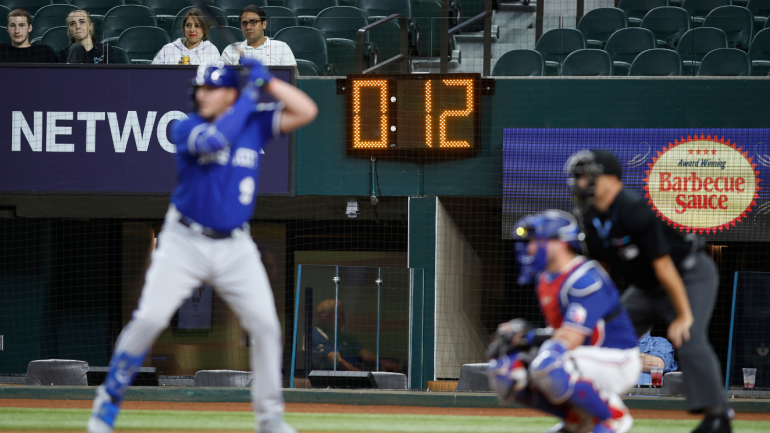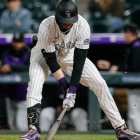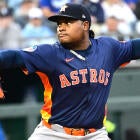
Major League Baseball announced a series of rule changes Thursday that were approved by the competition committee for the 2024 season, though it would be more accurate to call these "tweaks" or "slight modifications" instead of major changes.
The changes that will draw the most attention involve the pitch clock -- specifically, a reduction with runners on base -- and requiring a pitcher who warms up on the mound (as in, not the bullpen) to face at least one batter, thus cutting down the strategies behind burning pinch hitters.
Let's run through these:
The players have been pushing to have the lane between home plate and first base widened for a while and it should be helpful for both the runner and the defense. Sure enough.
Runner's Lane: The Runner's Lane will be widened to include the dirt area between the foul line and the infield grass. Widening the lane allows batters to take a more direct path to first base while retaining protection from interference. The distance between the foul line and the infield grass will be between 18 and 24 inches in all parks, with some limited grace periods granted by MLB due to difficulty in modifying the field (e.g., synthetic turf field).
The rest of the rules involve the pet issue of commissioner Rob Manfred, which would be pace of play. Major League Baseball noted in the announcement that between April and September, the average time of a game increased seven minutes (or about five minutes when controlling for things like the number of pitches and runs scored).
Here are the changes to address this issue, including shortening the pitch clock and eliminating one mound visit.
Timing Between Pitches: Reduce time from 20 seconds to 18 seconds with runners on base. Pitchers began their deliveries with an average of 7.3 seconds remaining on the 20-second timer in 2023. Pitchers retain the ability to step off and re-set the Clock up to two times without penalty. Violations with runners on base were the least frequent (14% of all violations vs 32% of all pitches) in 2023. A universal 17-second Clock used for the final month of the Triple-A season did not increase violations with runners on base.
Batter Timeouts: Based on player feedback, MLB withdrew a proposal that would have required the home plate umpire to immediately reset the Pitch Clock after a batter called timeout.
Pitching Changes: If a new pitcher steps onto the warning track with less than 2:00 remaining on the inning break Clock, the Clock will reset to 2:00 rather than 2:15 as was the case in 2023. Inning breaks that contained a pitching change averaged 2 minutes and 35 seconds in 2023 (broadcasters are only guaranteed two minutes of commercial time).
Mound Visits: Mound visits will be reduced from five per game to four, and an extra mound visit will still be awarded for the ninth inning if the defensive team has zero remaining at the end of the eighth inning. Mound visits rank among fans' least favorite events in baseball. Clubs averaged only 2.3 mound visits per game in 2023. Last season, 98% of games would not have exceeded a limit of four mound visits. Umpires will also permit defensive players to signal for a mound visit without actually visiting the mound to further help improve pace of game.
Circumvention: The FTC will now restart the timer after a dead ball (e.g., foul ball) when the pitcher has the ball and play is ready to resume. There will no longer be a requirement for the pitcher to be on the mound, removing the pitcher's ability to delay the start of the timer by walking around the edge of the mound.
Pitcher Who Warms Up Must Face At Least One Hitter: A pitcher who is sent out to warm up for an inning must face at least one batter (in addition to any requirements under the Three-Batter Minimum rule). There were 24 instances this season where the pitcher that warmed up between innings was replaced before throwing a pitch (adding approximately three minutes of dead time per event). There were two such instances during the 2023 World Series.
Tony Clark, executive director of the Major League Baseball Players Association, has issued a statement on these changes. The competition committee is made up of 11 voters -- six owners, four players and one umpire -- which means that the players can be outvoted on issues.
"This afternoon, Player Representatives voted against the 2024 rule changes proposed by the Commissioner's Office. As they made clear in the Competition Committee, Players strongly feel that, following last season's profound changes to the fundamental rules of the game, immediate additional changes are unnecessary and offer no meaningful benefits to fans, Players, or the competition on the field. This season should be used to gather additional data and fully examine the health, safety, and injury impacts of the reduced recovery time; that is where the focus should be."
![[object Object] Logo](https://sportshub.cbsistatic.com/i/2020/04/22/e9ceb731-8b3f-4c60-98fe-090ab66a2997/screen-shot-2020-04-22-at-11-04-56-am.png)


















